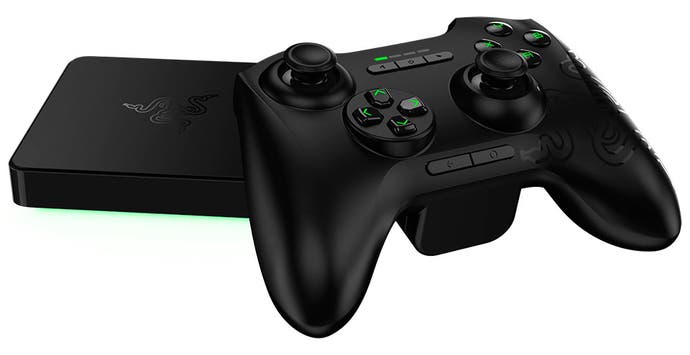Ouya isn't honouring its funding commitments following Razer's acquisition - report
UPDATE: Razer will pay $620K to honour Ouya's unfulfilled promotion. Dev confirms this.
UPDATE 29/07/2015 2.30am: Here's Razer's official statement on why it's honouring Ouya's promotion:
Razer and a new Ouya publishing entity will work to satisfy previously involved Free the Games
"Razer has a real interest in supporting indie developers and furthering the expansion of Android (FtG) developers, while creating a more open, sustainable distribution model that benefits gamers and expands revenue opportunities for all parties involved.
Razer plans to back the new Ouya to fulfill an estimated $620,000 fund established for FtG developers who had signed FtG agreements with the original Ouya and who fulfill their FtG agreement milestones and related commitments on Kickstarter.
Qualified FtG developers will need to sign up with the new OUYA for a new publishing agreement.
Financial terms will remain largely the same with one notable exception. Advances under the FtG agreements demanded commercial exclusivity to the Ouya platform. Under the proposed new agreements, Razer and Ouya publishing will forgo exclusivity in favour of developers providing an equitable amount of their FtG-funded titles to gamers for free on the Cortex TV platform. For example, if $10,000 is funded toward a $1 game, then 10,000 games at $1 would be given away at no cost to gamers on Cortex TV. Ouya publishing will not limit developers in any instance to one or another platform, but will promote publishing to all Android platforms-Google Play, Cortex TV, XiaoMi, Alibaba, and the likes.
Razer has a real interest in supporting indie developers and furthering the expansion of Android gaming on TV. Moving forward with this plan will ensure that both interests are met, as openly, widely, and beneficially as possible. Razer did not acquire hardware, agreements, pre-existing liabilities or debts from Ouya-only software related to the Ouya store and content catalog. Razer must sign new agreements with FtG developers, since there are no existing legal or non-legal developer relationships. Razer's credo is “By Gamers. For Gamers.” Giving back to gamers, game developers and those who support the gaming lifestyle is what it's all about."
UPDATE 28/07/2015 11.50pm: Developer Matt Gilgenbach, whose Neverending Nightmares qualified as a Free the Games Fund title, has confirmed to Eurogamer that he's in talks with Razer about getting the funding he was promised from Ouya.
"We've been working with Razer to work out a deal relating to the Free the Games Fund, and they've been very responsive in trying to get this situation sorted out," he told us in an email.
"We hadn't received the final 25 per cent payment of $24,750, but Razer has been working diligently to make sure that we do receive what is owed to us," he added.
UPDATE 28/07/2015 10.24pm: Razer will honour Ouya's Free the Games Fund promotion by funding developers still awaiting their incentive.

As reported by Polygon, Razer CEO Min-Liang Tan confirmed the company will cover Ouya's outstanding debts, which equals roughly $620K.
According to one of Polygon's anonymous sources, only a half-dozen of the 27 developers partaking in the promo were paid in full.
Tan, who was en route to China for a trade show when this story broke, said the entire issue was a surprise to him as he didn't realise Ouya hadn't already paid everyone involved in the Free the Games Fund promo. After all, the promotion launched nearly two years ago.
"We only acquired the team, the platform and the assets of Ouya," Tan told Polygon. "We didn't look at the debts because that's not how the deal was structured for us."
As such, Razer isn't legally obligated to follow through, but Tan figured it was still the right thing to do - plus it would bolster Razer's library of upcoming titles.
"What we want to do is make sure we support indie developers," Tan said. "Razer will be backing the new Ouya publishing arm. So we are going to try and make good on this fund and give these developers an option."
As such, here's how the new restructured offer will work:
Devs no longer need to make their games exclusive to the platform in question (in this case Forge TV's Cortex storefront instead of Ouya). That's great for developers wanting to make multiplatform games, but there is a catch: devs will have to give away enough copies on Cortex to equal the funds they've been given.
The example Tan gave Polygon is as follows: If Razer gives a developer $10K and the game is being sold for $10, the developer will have to give away 1000 copies on Cortex.
As such, it's basically like Razer just made a lot of small Kickstarter pledges. Devs get their funding and in return have to give away lots of copies.
Outside of that, the financial terms for the promotion will remain the same.
"For ourselves at Razer, we've always done stuff for our fans," Tan said. "This is purely being done out of goodwill. I think this is going to be great for the developers. I think they're going to be able to get the games done and gamers will get access to games for free. Then those games will spread through word of mouth."
ORIGINAL STORY 28/07/2015 7.58pm: Two years ago Ouya launched a promotion called Free the Games Fund, wherein it would match Kickstarter pledges for successfully funded Ouya titles. So if a game raised $100K from backers, Ouya would offer another $100K.
The idea was that it would dole out a fund of $1m scattered across several independent projects to help promote the Ouya brand as well as expand its library. Sure, there were some troubles along the way with folks finding loopholes in the promo and Ouya had to revise its rules, but by and large the promotion helped a lot of independent developers attain the funds needed to make their games.

But now, it's looking like Ouya may not be honouring its promotion after all. As reported by Motherboard, numerous developers have claimed Ouya is using its software acquisition by Razer as an excuse to bail on its funding commitments.
The way the Free the Games Fund promo worked was that developers would receive half of their money from Ouya upon completing a playable beta, another 25 per cent would arrive upon launch, then the final 25 per cent would come after the Ouya-exclusivity period.
Yet Ouya added a stipulation to its policy regarding "Termination Upon Bankruptcy or Insolvency." According to Motherboard, this addendum was added earlier this year and states that either party could terminate the agreement "in the event that the other party becomes insolvent, unable to pay its debts, or goes bankrupt."
One anonymous developer told Motherboard that they received their first installment (the 50 per cent), but didn't think the rest would be coming. "I've been working on bringing the game to release expecting to attain the remaining two installments but that won't happen now. A lot of hard work went into controller support and UI elements just for Ouya. It's hard to ask for additional artwork to finish a game when the tail end of your budget just disappears, much less advertise upon release."
The developer said Ouya suggested Razer may fulfill the commitment, but that they hadn't yet received a response from Razer.
"Claiming Ouya no longer exists as a company to get out of funding commitments, while continuing to use the name in the announcements today as if they still are a company that exists, or that they've somehow transformed the company into a product or service, just stinks," another anonymous developer added. "I think Razer will have trouble ahead if this is the level of respect they continue to show indie devs."
A Razer spokesperson told Motherboard that Ouya's Free the Games initiative was not included as part of the acquisition.
We've reached out to Ouya, Razer and more developers caught in the middle of this for a response.

